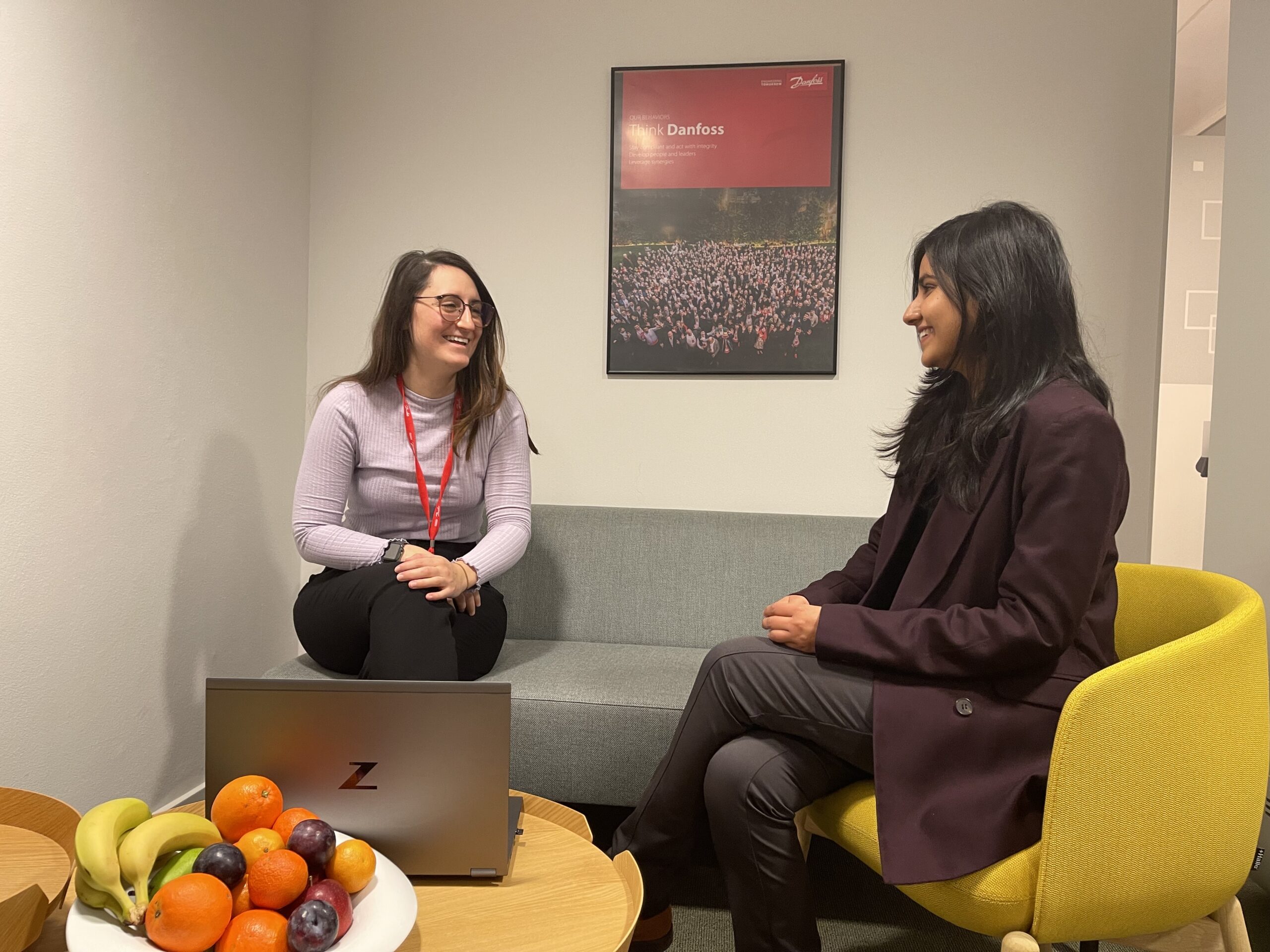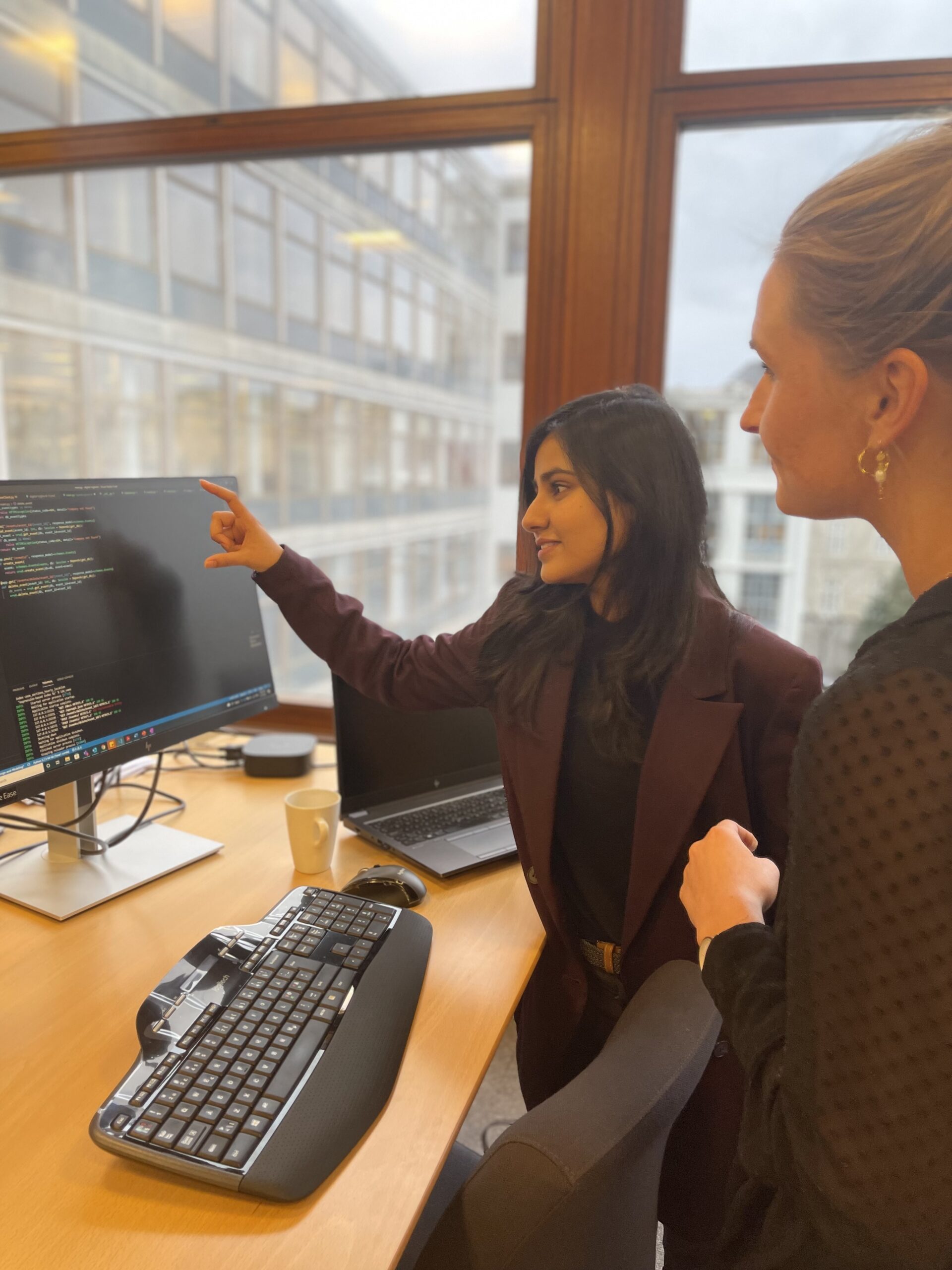
About Sayyada Shaama Hasan Kazmi
I’m currently in my first rotation on the innovation track which is more engineering-focused. I’m working in the data analytics team in Electronic Controllers and Services with specific focus on the refrigeration system of our food retail clients. We’re trying to make smart solutions that are based on data science and machine learning. We are using data and providing the clients with visualization and more transparency into how their systems work.
➔ Hiring! Danfoss are hiring graduates right now. Click here for more details on the programme.
How did you start at the Danfoss Graduate Programme? Where did you first hear about it?
I didn’t know about Danfoss when I lived in Pakistan – except for India, the company is not very well known in South Asia. I heard about it while I was doing my Master’s in Denmark. In one of my courses, an external speaker came to talk about Danfoss, an engineering company that is now focusing more on digitalization and smarter solutions using data. The fourth industrial revolution using AI is an exciting opportunity, more and more industries are transforming, and a company going through this change excited me.
During our Career Week, aside from stalls informing about different companies, there were also focused webinars explaining the application process for graduate programmes, and introducing the respective companies. I heard about Danfoss there again and did my own research. I saw that they are working towards sustainability and climate change. It was something I was very passionate about – data-driven work on climate change and climate solutions, that’s what I want to do in the future, so I felt I should really apply.

What else attracted you to Danfoss?
Mainly their character as an engineering company – as an engineer, you tend to apply for where your competencies lie. And when I heard about their digitalization journey, I realized I didn’t want to be at the receiving end of a product, i.e. working for a company that has already gone through the change as it is more exciting to be part of that process with unlimited possibilities of use cases of data. Danfoss was in the transformation phase, and I really wanted to be a part of this journey. One of the main reasons why I started my Master’s was to get more into data science. But I also wanted to work for a company that has a real goal of working towards sustainable solutions.
Why did you want to join a graduate programme?
When I started my Master’s two years ago, I didn’t know about graduate programmes, as they are not well known outside of Europe. But when I was working as a student developer at nemlig.com or during my internship at Ørsted, although I was doing what I wanted, I felt very siloed into one area. I didn’t have an idea of what went on in different parts of the company. When I learned about the graduate program, I realized I wanted to explore different parts of the company before I actually start working in one of them so I get to try different areas and different teams.
This is what I really like about the Danfoss graduate programme – although I’m on the innovation track, I can switch to supply chain or strategy or anything more business-oriented. Even though I don’t have the background, I can explore those areas as well. My reason for moving to Denmark was to get a perspective of the different cultures and backgrounds and try to think more out of the box. This experience has given me a different perspective, a different way of thinking.
I also wanted to work at a global company where I can interact with more international employees, and where I get to travel more so that I can keep developing this part of myself with an open perspective.
I realized I didn’t want to be at the receiving end of a product, i.e. working for a company that has already gone through the change as it is more exciting to be part of that process with unlimited possibilities of use cases of data. Danfoss was in the transformation phase, and I really wanted to be a part of this journey.
What has surprised you the most about working at Danfoss?
As I mentioned, I got to know Danfoss through an external speaker – and at my first interview with my project owner, I interviewed with this person who introduced me to the company. A really pleasant surprise.
When I got into the team, it was such a fun experience. My team is very innovation-driven, which is something you wouldn’t expect from a traditional engineering company. Our focus was hardware products, and now we’re going through this digital transformation and focusing on climate solutions. I am working in a segment called Climate Solutions which focuses on our heating and cooling products, and my project is focused on reducing CO2 emissions. I was so excited about this – it’s not just that I’m going to learn from this experience, but I will also start making some impact, even though it’s just a six-month journey.
I got to learn more about different projects in the company that are focused on climate and sustainability, such as reduced emissions, circular economy, and smart energy utilization. It was also one of the key points Kim Fausing, our CEO, mentioned when we met him during our introductory week.
Hence, it’s a nice surprise that sustainability is not just something mentioned on a pamphlet but is very much part of the company’s core values and action plan. If you want to, if you have some innovative ideas that you can pitch to the company, then you can also get started on them. For me, it’s a pleasant surprise because it’s something that I wanted to do. I feel that I can make this impact while being here, accomplishing my other goals as well.

What has been your biggest challenge as a graduate?
It’s a very good, but also a very challenging opportunity. The way the Danfoss program is structured is that you have four rotations and do four projects throughout. Currently, I’m on my first one. So far, my biggest challenge has been getting into a role in a new team with a project that has an expected delivery deadline of six months.
While doing that, I also have to know more about the company, network, talk to high-positioned stakeholders, and take part in the social aspects of being a graduate. It’s diving deeper into my project while trying to integrate into a team where I’ll only stay for six months – but also learning what goes on in different parts of the company as I am in the phase of selecting my next rotation.
But I have grown so much in three months that I am able to manage all of this. You have many goals at the same time. You have to have your own learning objectives, contribute to the team, and think about what is best for your future. What is the next step? What more can I do? What more can I learn?
How do you see your future with Danfoss?
I see myself as contributing to Danfoss in the future because I feel like the program is helping us so much not just in our professional development, but also in our personal development. In the future, I also want to contribute as a leader where I can strive towards achieving our more innovative objectives – striving towards innovation rather than staying at a standstill.
I see a lot of opportunities here because it’s such a big company, and there are so many different products and different things going on. This is what I also learned from my colleagues. When they’d been working in one of the segments for a long time, they could just switch to another role. It’s very easy to move around in the company and do something new, and still contribute.
It's a nice surprise that at Danfoss, sustainability is not just something mentioned on a pamphlet but is very much part of the company's core values and action plan. If you want to, if you have some innovative ideas that you can pitch to the company, then you can also get started on them.
Do you have any advice for other applicants?
It’s important to clarify your own objectives before applying. If you want to work on a single project in one team, a full-time job would suit you better. If you want to work in a challenging environment where you’ll be moving every six months and working in different parts of the company, you should consider a graduate programme, and you should be able to adapt easily and learn at a fast pace.
What Danfoss is looking for is passion. It’s important to do your own research. What is the company working on? What is most important to them right now? What is their future objective? You need to see if you have an internal desire to contribute to that, to be a part of that change. It’s crucial to have a clear perspective about the company and what they do, what your goals are, and what you want to achieve in the graduate programme.
➔ Hiring! Danfoss are hiring graduates right now. Click here for more details on the programme.